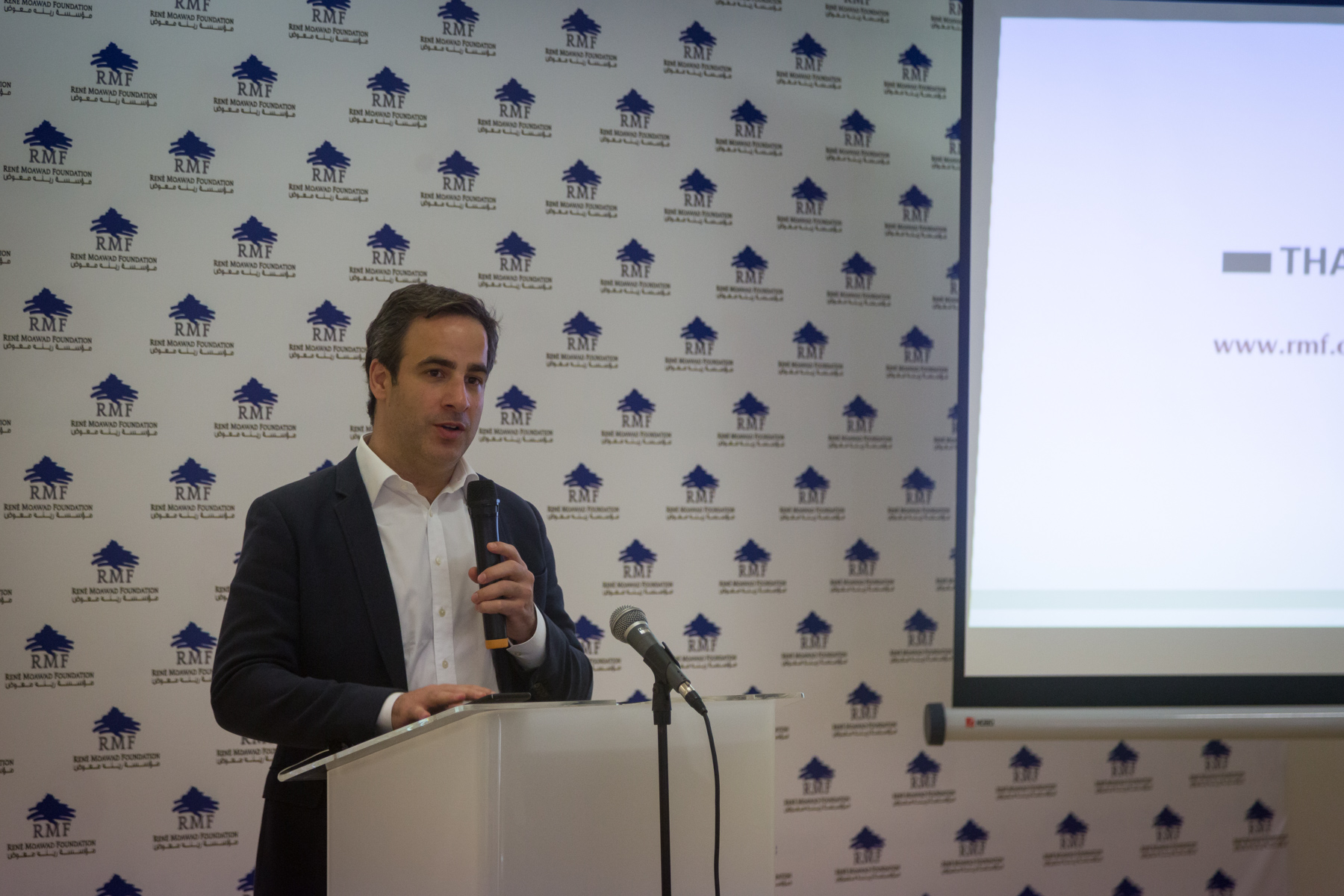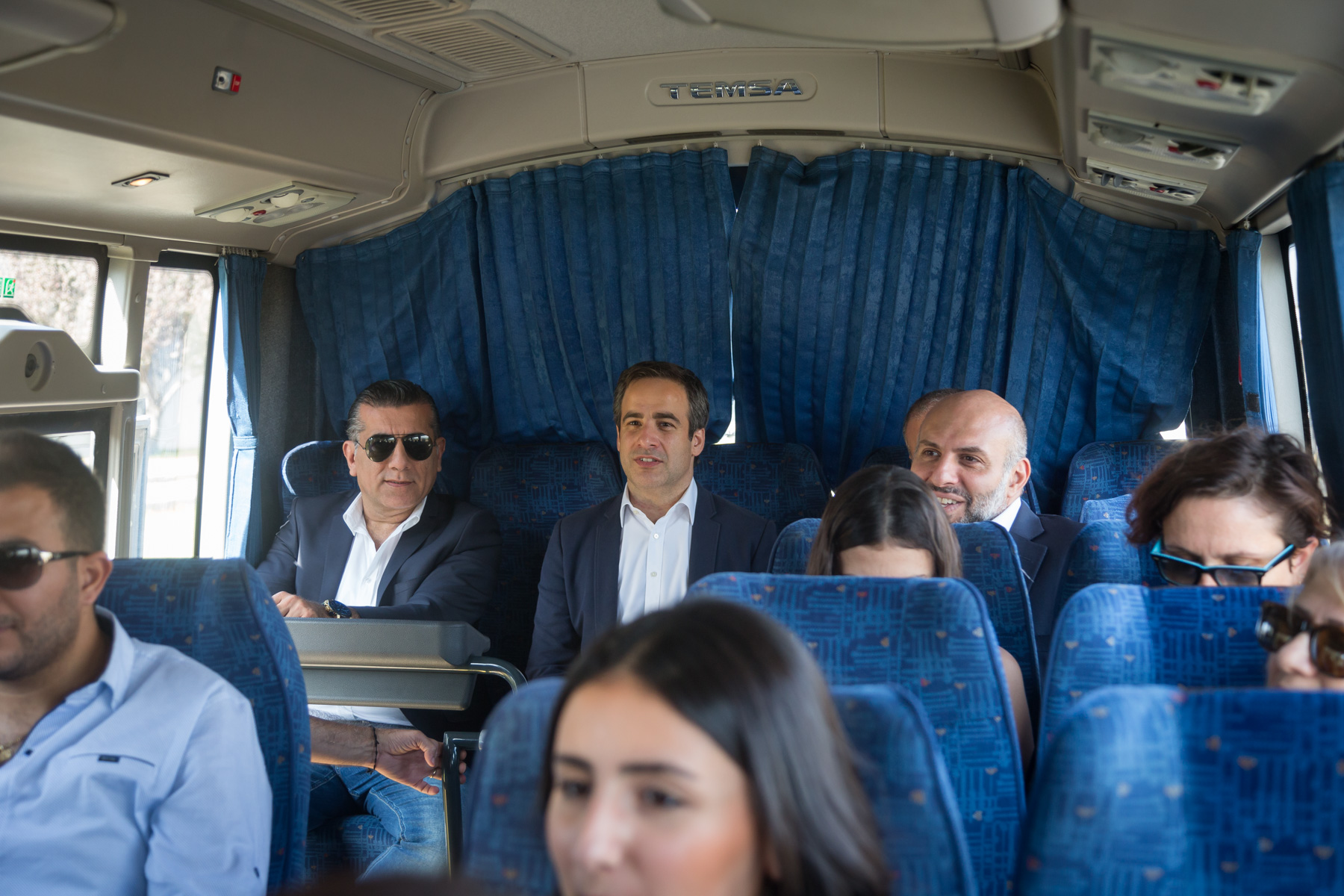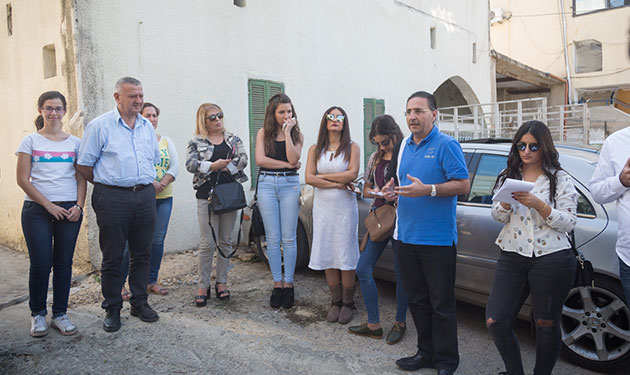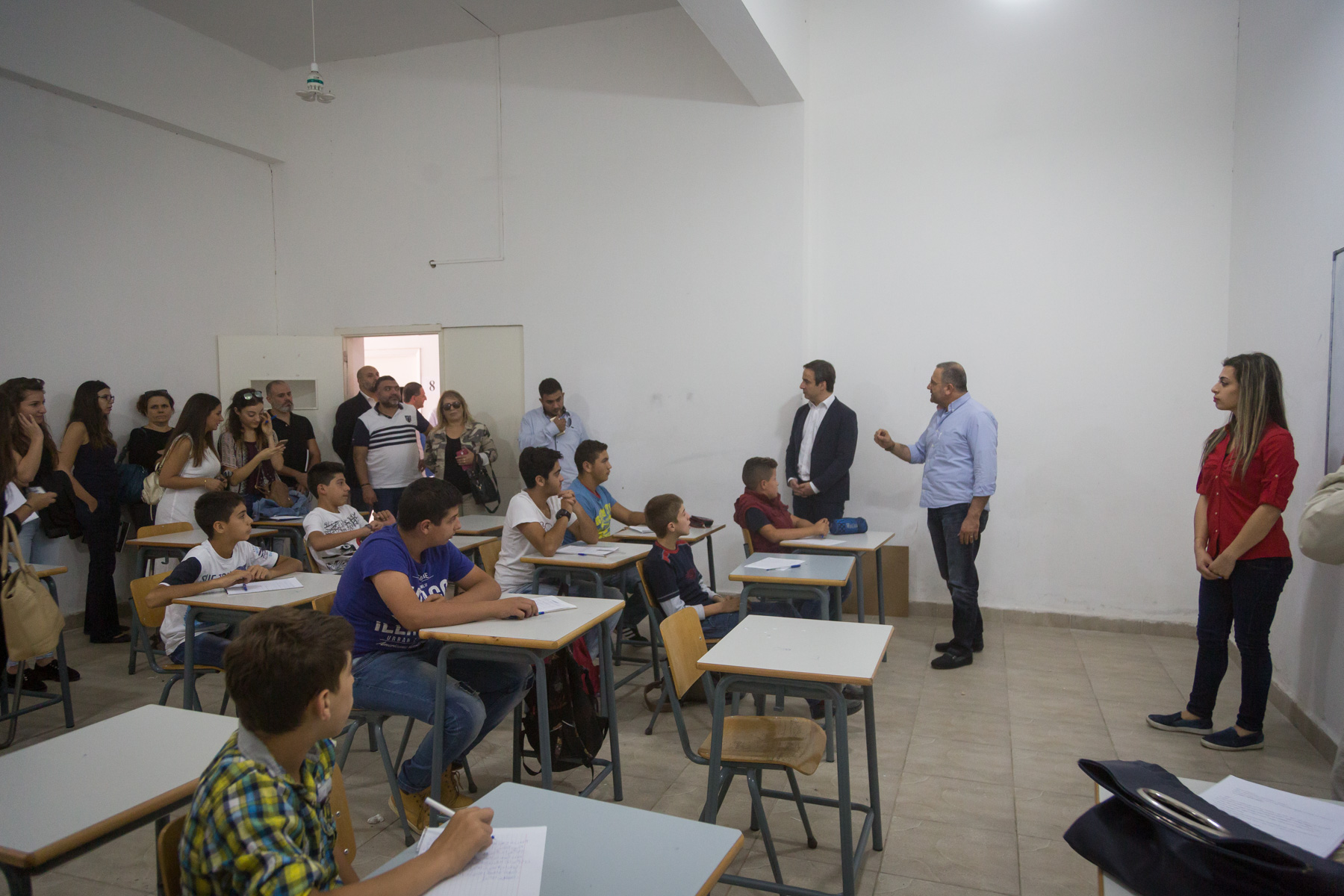On October 20th, 2017, RMF invited media representatives from the various political affiliations of the country for a ‘Media Day’. The invitees included journalists from the written, audio and television Medias, in addition to media people from various electronic websites and social media.
The day’s activities included visits to Ardeh and Kfaryachit to introduce two projects, revolving around Renewable Energy, executed by RMF in the two towns.
The day started at the RMF Mejdlaya headquarters, where the invitees joined RMF’s administrative staff for a ‘Saj’ breakfast. Buses had been arranged to take everyone to Kfaryachit and Ardeh.

Kfaryachit
The first stop was Kfaryachit where the group was welcomed by the Kfaryachit mayor Georges Wakim and local residents. Wakim explained to the journalists the importance of the new “Generation of Electricity for the Kfaryachit village through Renewable Energy” project and other projects executed or being executed by RMF, especially those based on Renewable Energy. ‘These projects’, Wakim said, ‘benefit a larger number of local citizens’.
RMF’s Baladi project Operation Director, Antonio Moawad, gave a comprehensive presentation on the deprivation that Kfaryachit and other Zgharta Caza towns and villages suffer from. He explained how this led RMF along with USAID to come up with a series of projects based on Renewable Energy, answering at best the local people’s needs.
The “Generation of Electricity for the Kfaryachit village through Renewable Energy” project is funded by USAID and executed by RMF within the framework of the “BALADI” program to build alliances for local advancement, development and investment. Its goal is to help the local community in reducing their electricity bills.
The proposal for the project was presented by the Kfaryachit Municipality, in coordination with the Parish Committee and the Youth Group in the town.
The project is establishing an on grid 60 kilo watt peak (kWp) photovoltaic system linked to the municipal generator. It is also installing 144 solar water heating systems for households in the village, equipping 26 street light poles with photovoltaic systems, and conducting awareness sessions on the efficient use of electricity power for the local people and school students.
The beneficiaries are:
- 750 local residents.
- 200 Syrian refugees.
- 450 persons, benefiting from awareness sessions on the benefits of solar energy.
- 750 persons, benefiting from the hot water solar system.
- 950 persons, benefiting from LED lamps distribution.
- 6 Micro, Small and Medium Enterprises (MSMEs) such as shops and businesses, which include 20 members.
- 3 long term jobs created (administrative assistance, field supervisor, and technical electrician).
- 800 persons, benefiting from the photovoltaic power system and from reductions in electricity bills.
Ardeh
The second stop was at Ardeh where locals welcomed the group in a warm way, offering sweets and drinks. They shared their appreciation for RMF’s work in their area at the social and humanitarian levels, offering their thanks to RMF’s Executive Director Michel Moawad, ‘who carries the people’s worries in his heart’.
The “Towards sustainable energy consumption in select local communities of north Lebanon (SUDEP)” project is funded by USAID and executed by RMF in partnership with the municipality of Ardeh. The project has established a strategy for energy efficiency in Ardeh and has led to the creation of an efficient policy for better power consumption in new buildings.
The project has also retrofitted street lights with high-efficiency LED, and developed a design guideline for high energy efficiency in the new municipal building. Six main areas around the village benefited from the installation of PV light systems, and training sessions were offered to municipal staff on energy efficiency solutions and financing.
Other activities conducted by the project:
– Holding energy audit on 300 homes and implementing energy efficiency measures.
– Implementing public awareness sessions.
– Developing, promoting and distributing 10,000 guidebooks on residential efficient energy use.
The direct beneficiaries for the project are the Local Authorities and the local community, consisting of 4,000 members. The indirect beneficiaries are around 200 similar Local Authorities in Lebanon (where 400,000 people live).
Back to Mejdlaya
After Ardeh, the buses headed back to the RMF headquarters in Mejdlaya where RMF’s Executive Director Michel Moawad welcomed them and accompanied them for a visit-tour to the main centers part of the complex: The René Moawad Technical Institute, the Dairy Processing Facility, the Ice Cream Production Center, the Fresh Cut Vegetable Processing Center…
After explaining the role played by each of RMF’s units and departments, where around 200 families work, Michel Moawad invited all those present to watch a documentary on the importance of administrative decentralization, with a presentation of the various social, economic and development achievements undertaken by RMF in all the parts of the country, from extreme North to extreme South.
Moawad
Talking to the gathering, Moawad said: “Our goal is to execute projects in all the parts of Lebanon”. He explained the importance and benefits of using Renewable Energy in cities and towns: “First, this strengthens the culture of protecting and preserving the environment – which is not a luxury, but rather an essential element for the welfare of the citizens. Secondly, it enhances administrative decentralization via the cooperation that gets built between international organisations and the municipalities. This, I believe, is essential and should be strengthened, as it is the basis of development throughout Lebanon.”
Moawad emphasized that the projects undertaken by RMF were not exclusive to North Lebanon, but are being executed in all the parts of the country. He explained that this was part of a comprehensive strategy that RMF has put, aiming to build a web of security for all the marginalised and deprived sectors in the country. Moawad enumerated the various projects being executed by RMF in the fields of educational support in schools, as well as economic, agricultural and production support, “to keep the Lebanese in their land.”
Answering the journalists’ questions, Moawad spoke about the present apples’ crisis, and announced that RMF is working to open new markets for the Lebanese apples, mainly the Russian market, hoping that RMF’s efforts will be successful.
He also revealed that RMF is viewed by international donors as one of the most important references for transparent social and development work in Lebanon, and has won the trust of these organisations and other international instances.
Moawad invited all those present for a lunch at his residence in Zgharta.

About RMF
RMF was created in 1991 with the objective to help build “a responsible civil society that strengthens the national unity and promotes democratic values and social justice”.
Remaining faithful to President René Moawad’s principles, the foundation is run today under the direct supervision of its Executive Director Michel Moawad, who follows in the footsteps of his late father.
RMF’s goal is to empower the human being both intellectually and financially through education, health and economic development to guarantee their dignity and basic rights, and to build their capacities as responsible citizens through various fixed operation centers, and donor supported projects.








 العربية
العربية